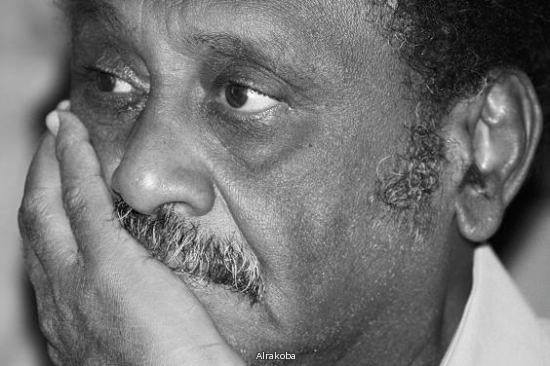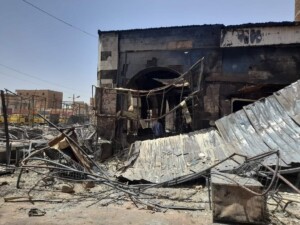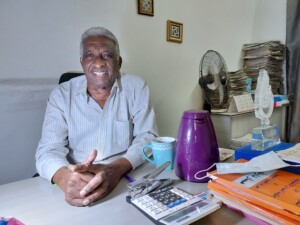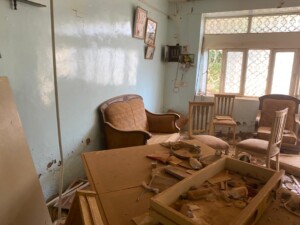Hashim Siddig, Sudan’s ‘multi-talented poet’, dies at the age of 77

Poet and dramatist Hashim Siddig (File photo: Facebook page of Hashim Siddig)
Many Sudanese are mourning the death of the famous poet and dramatist Hashim Siddig, who died in the United Arab Emirates (UAE) on Saturday morning. He was 77 years old. Siddig is not only famous for his epic poem on the 1964 revolution in Sudan, but also for his radio and television dramas.
His body was buried in Abu Dhabi, where he spent the last months of his life after he was forced to leave Sudan in September last year, because both his health deteriorated and the living conditions in Omdurman worsened due to the occupation of the paramilitary Rapid Support Forces (RSF) five months before.
Hashim Siddig was a creative, multi-talented poet. Millions of Sudanese knew his poems, in particular On a Strange Day, and Laugh, sang by famous musician Abu Araki El Bakheet, and other songs, sang by sang by the late very popular singer Sayed Khalifa. Many can recite large parts of “his immortal poetic epic” on the October 21 popular revolt against the military regime of Ibrahim Abboud in 1964.
The ArabLit Quartely posted a translation of his poem A Tale of the Rose and the Street, which was put to song by Nancy Ajaj.
Siddig was also an actor and playwright. His play Nabta Habibati [Napata, my love] caused a shift in the history of Sudanese theatre. He wrote pioneering contributions to radio drama, with series like Gatar El Ham [land of worries] and to television drama, in particular Teir El Shafag El Gharib [a strange twilight bird]. He also presented many radio and television programmes, the last of which was a series of reviews on world cinema.
Hashim Siddig taught generations of students at the Drama and Music College in Khartoum, after he graduated there himself in 1974 and studied acting at a British institution. He was persecuted and regularly detained during the military regimes of Jaafar Nimeiry (1969-1985) and Omar Al Bashir (1989-2019). His revolutionary poems circulated in opposition circles, especially his poem Gerentiya [rhinoceros] which left its mark on the history of the Sudanese’s struggle against military dictatorship.
Shukrallah Khalafallah, writer and television director, considers Hashim Siddig “a national and artistic symbol who represents the memory of a nation”. He told Radio Dabanga on Sunday that the people in Omdurman and in particular the Banat neighbourhood, where he lived, “are wearing a mourning dress today because Hashim Siddig represented the national radio, television, theatre, folk arts, acrobatics, film production, and the Artists Union for Omdurman.
“All of these ‘neighbourhoods’ have become orphans with the departure of Hashim Siddig – as he was a milestone in the history of many creative people. He taught them and learned from them things that cannot be obtained from books.”
Khalafallah recounts that a few days before the disastrous war broke out between the Sudanese army and the Rapid Support Forces (RSF), on April 15 last year, he went to see Siddig at his home, together with Abu Araki El Bakheet. “Despite his health conditions, he insisted on receiving us lying on his bed. We discussed new projects together, the most important of which was a project to document his career. The interview was supposed to be held on April 16 and would be presented as part of the Eid El Fitr [feast at the end of the fasting month of Ramadan] programme, but the war cut off everything.”
He said that Siddig’s last wish, to return to Omdurman, was not fulfilled. “His long journey from Banat to El Sawra [district in northern Omdurman], from there to Atbara, from Atbara to Port Sudan, and then to the UAE left a deep wound, making his return to Omdurman his first and last concern.”











 and then
and then